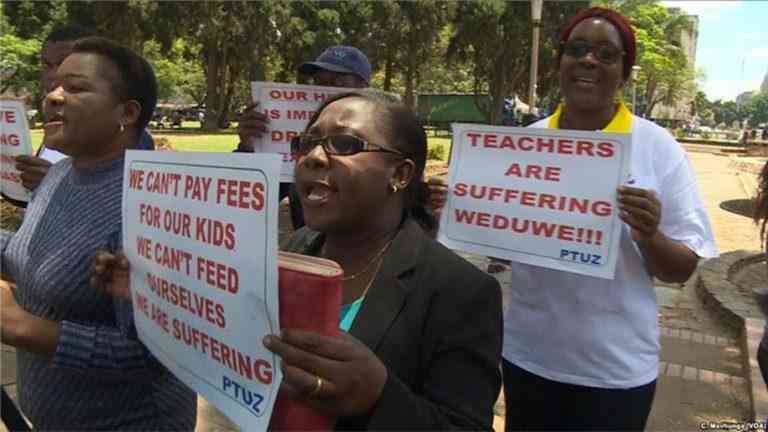
TEACHERS unions have revealed that they are overwhelmed by reports of teachers retiring early, amid revelations that at least 15 000 leave the sector each year due to poor working conditions.
Progressive Teachers Union of Zimbabwe president, Takavafira Zhou, yesterday said they had been receiving reports of teachers leaving or contemplating leaving the profession due to poor working conditions and low salaries that are being outpaced by an escalating cost of living.
“Yes, we have received such cases. What is most worrisome is the delay in processing retirement benefits for those who formally retire, with some even passing on before accessing retirement packages. The sciences (Mathematics, Physics, Chemistry, Biology, Combined Science and ICT (computers) are the most affected,” Zhou told NewsDay.
“The statistics for early retirement or any other form of retirement are very difficult to get. However, we are losing between 15 000 and 20 000 teachers per year through desertion. Statistics for this are computable because, apart from getting monthly provincial reports, the Salary Services Bureau also gives monthly indications of members whose dues cannot be deducted after leaving teaching.
“There is a general feeling that the government is deliberately fixing teachers for a crime best known by the employer. Many teachers have also been psychologically affected by the blame levelled against them, when they are doing so much with so little.”
He said there was little room for engagement with the government resorting to imposing things, such as curricula, “without appropriate educational taxonomy and prudence, let alone interoperability, standardisation, provision of learning and teaching materials”.
Zhou said teachers were frustrated as there was little room for motivation, innovation and dynamism in teaching, with educational issues being imposed instead of being “products of logical disputation and engagement”.
“There is so much political interference in running schools, with administrators even suspended for professionally doing their duties, such as protecting other students from abuse by children of politicians in schools. There is so much interference in running schools with school development associations or committees coming directly under political influence and manipulation of tenders in schools,” he said.
- Mavhunga puts DeMbare into Chibuku quarterfinals
- Bulls to charge into Zimbabwe gold stocks
- Ndiraya concerned as goals dry up
- Tarakinyu, Mhandu triumph at Victoria Falls marathon
Keep Reading
“Lessons are frequently disrupted and schools are given orders to ensure pupils attend political gatherings, particularly where elite politicians or their wives would be guests of honour. All these disturbances are never considered when pupils’ performance decline. Schools are no longer safe institutions of teaching and learning.”
Zhou said the greatest challenge was failure to understand the importance of engagement and the establishment of a credible education system.
He said there was a growing tendency to disregard education, with most rich people being dealers or zvigananda, adding that major priority must be given to harnessing intellect for establishing a credible system that could foster sustainable development of the nation.
“Those in the line ministry must have educational taxonomy, while school heads must be appointed on merit and allowed to tap and harness intellect from teachers in a school to drive the best education system punctuated by innovation, dynamism and research,” Zhou said.
“There must also be engagement with teacher unions in fostering realistic educational reforms that can entrench life-serving skills and a revolutionised education system in Zimbabwe. Teachers must be well remunerated and supported with learning and teaching materials, and given their professional space to guarantee quality public education in Zimbabwe.”
He expressed concern that the government seems not to be worried about the exodus of teachers and expertise from Zimbabwe.
“What is worrisome is the poor salaries and conditions of service in a country with abundant natural and human resources. We need to minimise capital flight, tap and harness our natural resources appropriately, process them locally and add value and beneficiate, and pay government workers well,” Zhou said.
“Teaching is the mother of all professions and teachers manage the best asset of a nation in terms of youth, and must be paid well."
Amalgamated Rural Teachers Union of Zimbabwe president Obert Masaraure said they were battling to convince members to remain on board.
“The largest volume of cases we handle these days is of people in need of advice on how to secure a favourable early retirement. Teachers are fed up with the thankless job and want to move on to other endeavours in life.
“From our union, we currently handle up to 50 cases of teachers who are going on early retirement. We do not have actual national statistics,” he said.
Masaraure said teachers were always looking for a way out of the profession.
“At times, the teacher is simply thinking of investing the pension into some income-generating project. The government should engender a culture of genuine dialogue with employees and find ways of providing monetary and non-monetary incentives to the hardworking teachers,” he said.
Taungana Ndoro, the Primary and Secondary Education ministry’s spokesperson, was still to respond to questions sent to him at the time of going to print.










